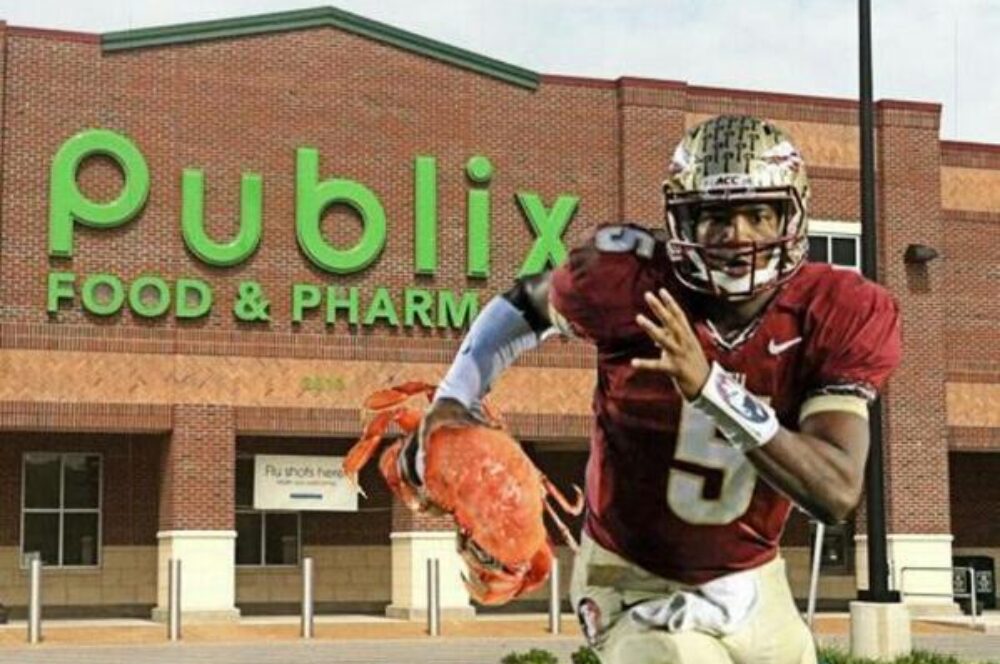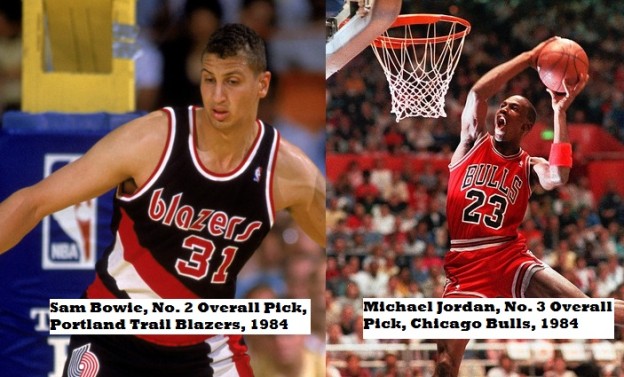In the 2015 Rose Bowl, Florida State’s chance for a second consecutive FBS title ended with a humiliating 59-20 loss to Oregon. Although only a semifinal game in the first College Football Playoff, the match-up between Jameis Winston and Marcus Mariota will provide an interesting backdrop as these two Heisman Trophy winners move on to the NFL. As a college superstar who likely will be a top 10 overall pick, Winston will be eligible for consideration as a Top 10 Bust when his career ends. Should I start the betting at five years?
In a prior post, Jon Koncak and Joe Kleine were identified jointly as the 4th Worst NBA Draft Pick. They earned this distinction for being selected ahead of three Hall of Famers (Chris Mullin, Karl Malone, and Joe Dumars) and four other star players (Detlef Schrempf, Charles Oakley, AC Green, and Terry Porter). Despite this honor, Koncak and Kleine are not on the short list for Top 10 Busts because they were too productive in their careers. Regardless, they provide an interesting side story to the countdown. At the same time, this post also highlights the underwhelming careers of oft-considered busts Keith Lee and Kenny Green.
1
As discussed in a previous post, Sam Bowie is often highlighted as the biggest bust in NBA history simply because he was drafted ahead of Michael Jordan. While it’s clear that the Trail Blazers made a really bad decision regarding their 2nd overall pick in the 1984 Draft (especially given that Portland also passed up on Hall of Famer Charles Barkley), Bowie was not an all-time bust. In particular, he averaged approximately 11 points and eight rebounds per game during his career. On behalf of all players who achieved at least a minimum threshold of production during their careers and in honor of the most inappropriately maligned player in NBA history, I have created the Sam Bowie Exemption.
6
If NBA games were only five minutes long, Acie Law may have been an all-time great. Well, they’re not, so he’s not. As a senior at Texas A&M, Law was named 1st Team All-American and won the Bob Cousy Award as the best point guard in the country after averaging 18 points and five assists per game. Despite being a clutch performer in college who elevated his game at the most critical moments, Law never elevated beyond backup duties in the NBA. During his four-year NBA career, he averaged less than four points and two assists per game while playing for five different teams. As previously established, any player taken after the first ten overall picks is exempt from being declared a Top 10 Bust. But for this restriction, Law would have been a prime candidate. Instead, he earned an Honorable Mention and an eponymous exemption.
1
In honor of the 20th anniversary of Dumb and Dumber (versus the new release of the far inferior Dumb and Dumber To), this post simplifies the previous one regarding the distribution of win shares for 1st round NBA draft picks. There still are a lot of numbers, but the takeaways should be easier to understand. Just to be sure, here they are.
1. Generally, draft order is a good predictor of future success in the NBA. As such, the higher the pick, the better the player should be to avoid being labeled a bust.
2. Starting with the 11th overall pick, the probability of being a flame-out exceeds the probability of becoming an All-Star by a margin of 2:1 (40% to 20%). For that reason, players taken outside of the first ten overall picks have been excluded as potential Top 10 Busts.
3. NBA legends are rare, but not as rare as you might think.
0
To be fair, the following post is geared towards “quant jocks” (ok, nerds) who have a reasonable knowledge of statistical distributions. In particular, I have used Weibull distributions to model different subsets of 1st round picks from over 40 NBA drafts. With different shape and scale parameters for each subset, the expected value of a draft pick can be estimated with statistical probability. Based on my analysis, I developed a methodology to define a bust objectively in order to overcome the bias which seems to be apparent in existing lists of all-time busts. If you work for an NBA team and came across this site, you should read this post.
0
As surprising as it might sound, Wilt Chamberlain is one of the most underrated players in NBA history. While his height was certainly an advantage, his athleticism is often overlooked. Whether fair or not, professional basketball players are remembered most for winning championships and Wilt only won two titles while his biggest rival, Bill Russell, won eleven. The following post highlights some of Chamberlain’s individual records, but focuses more on the rule changes which were inspired by him. Jordan may be the greatest basketball player ever, but Chamberlain changed the game more than anyone else.
1
Oscar Robertson arguably was one of the top five or ten players in NBA history with extraordinary talent as a scorer, rebounder and passer. As an indication of his all-around ability, he is the only player to have averaged a triple double for an entire season. Less well known, but perhaps even more impressive, was his achievement of averaging double digit points, rebounds and assists over the first five years of his career. As an aside for stat junkies, he was 0.05 rebounds per game away from doing it through his first six seasons. For as incredible as Robertson’s “triple-double season” was, however, it might be overrated. To start, the infrequency of triple doubles today (on average, one occurs every 36 games) skews our perspective of it. Furthermore, the concept didn’t exist until five years after his retirement so the accomplishment was the product of retroactive data mining. If the NBA had recognized the stat in the 1960s, who knows how many triple doubles Robertson would have recorded. Then again, who knows how many other players (e.g. Wilt Chamberlain) would have had as well.
0
Like it or not, the nerds have changed how we look at sports. Thanks to sabermetricians, statistics like OPS and WAR are as recognizable as HR and RBI. Similar to WAR (wins above replacement) for baseball, WiSh (win shares) is an all-encompassing statistic for basketball. Ranked by WiSh, the Top 5 players in NBA history are: 1) Kareem Abdul-Jabbar; 2) Wilt Chamberlain; 3) Karl Malone; 4) Michael Jordan; and 5) John Stockton. Without a doubt, each one of those players is a legend of the game. As an all-time NBA ranking, however, it’s just doesn’t work.
Alternatively, the Top 5 players ranked by total MVPs are: 1) Michael Jordan; 2) Bill Russell; 3) Kareem Abdul-Jabbar; 4) LeBron James; and 5) Wilt Chamberlain. Aaahhh, much better. Arguably, MVP awards provide a better proxy for all-time greatness than win shares. Regardless, WiSh still can be useful to establish a threshold above which a superstar can be defined. Similarly, it can determine a threshold below which a bust can be defined.
1
If you’re simply looking for a list of well-known NBA underachievers, this post is the one you’ll want to read. Specifically, I have ranked the ten worst draft picks in NBA history as follows:
#10. Greg Oden (Center) – 105 games / 8.0 ppg / 6.2 rpg / 7.3 win shares
#9. LaRue Martin (Center) – 271 games / 5.3 ppg / 4.6 rpg / 1.9 win shares
#8. Dennis Hopson (Shooting Guard) – 334 games / 10.9 ppg / 2.8 rpg / 7.1 win shares
#7. Hasheem Thabeet (Center) – 224 games / 2.4 ppg / 2.7 rpg / 4.8 win shares
#6. Kwame Brown (Center) – 607 games / 6.6 ppg / 5.5 rpg / 20.0 win shares
#5. Todd Fuller (Center) – 225 games / 3.7 ppg / 3.0 rpg / 2.2 win shares
#4. Jon Koncak (Center) – 784 games / 4.5 ppg / 4.9 rpg / 29.2 win shares
Joe Kleine (Center) – 965 games / 4.8 ppg / 4.1 rpg / 19.1 win shares
#3. Michael Olowokandi (Center) – 500 games / 8.3 ppg / 6.8 rpg / 2.5 win shares
#2. Darko Milicic (Center) – 468 games / 6.0 ppg / 4.2 rpg / 7.1 win shares
#1. Sam Bowie (Center) – 511 games / 10.9 ppg / 7.5 rpg / 26.9 win shares
In subsequent posts, I’ll analyze each of these picks and describe why most of them aren’t all-time busts despite their disappointing careers. Hint: the media might have something to do with it.
1












4